If you are a younger traveler you might not realize that the number of hostels around the world has probably doubled or tripled in the past 10 years. Many of the newer ones are fantastic, but many are also converted apartments that offer few if any services, or they are struggling hotels in remote locations trying to fill otherwise empty rooms by stuffing them with IKEA bunk beds and charging appealingly low prices.
Another trend to be aware of is that the most famous and best located hostels in many cities have jacked their prices way up because they can still fill bunks based on momentum. Famous hostels are usually great, and often worth a higher price, but you shouldn’t book into one just because you’ve heard of it.
After countless trips in most of the popular cities around the world, I’ve made my share of mistakes when choosing accommodation. Usually they resulted from choosing a flawed place because it was so cheap, but now I know that strategy can backfire and partially ruin a visit or even taint my impression of an otherwise wonderful city. So here are 7 mistakes I know to avoid, and you should too.
7 Mistakes not to make when choosing a hostel
1 – Don’t choose a hostel in a shit location to save money
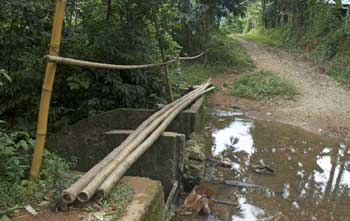
Those of us who search for hostels from lowest price to highest price can easily fall into a trap where we see a few choices at US$15 per night so it seems absurd to pay US$25 per night elsewhere. Then you arrive at your US$15 per night hostel to discover that it’s in a distant residential neighborhood a very long walk from the center, or worse yet, a long bus or tram ride away.
Time is money, as they say, and it’s wise to assume that you’ll want to be in the city center or tourist district at least two or three times per day. If you are staying in a prime location it means you can come and go as you please, seeing the sights, eating street-food, having Happy Hour drinks and whatnot, and when you get tired you can be in your bunk a few minutes later. But when staying in a remote location, you will waste time and maybe money going back and forth, and possibly skipping the nightlife because it’s too much trouble.
2 – Don’t sacrifice important features to save money
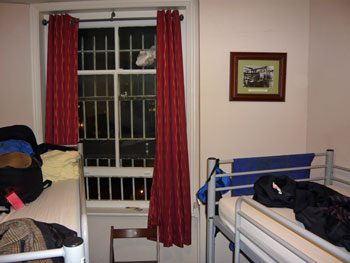
This is another area of trouble for those of us who gravitate to the lowest prices. I’ve stayed in hostels that have literally turned out to be an unmarked apartment with bunk beds in every room, and pretty much nothing else. That’s a fine way to save money for some travelers, but a poor choice for many of us.
Don’t discount the importance of having a 24-hour desk to help you with visitor advice, such as a cheap place to buy wine nearby. Having a common room or lounge to relax in is a huge benefit for many of us, and having access to a kitchen can save us most of the cost of one or two meals per day if that’s our style.
3 – Don’t confuse party hostels with non-party hostels
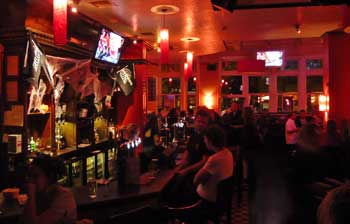
Fortunately there isn’t too much gray area, so if you prefer a party hostel then you owe it to the rest of us to look for one that is welcoming. And just the same, if you want a peaceful place to sleep, you owe it to the rest of us to look for a hostel that specializes in that.
It’s frustrating for the staff and also for fellow guests when a party group invades an otherwise chilled hostel, just as the reverse is true. It’s also unhelpful when these out-of-place guests leave scathing reviews because they actually booked themselves into the wrong sort of hostel.
4 – Don’t skip actually reading the reviews
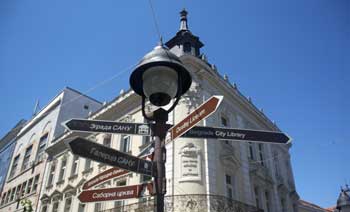
You’ll often see hostels that claim to be “10 minutes from the city center” when it’s really a 12-minute ride on a bus that only comes once an hour. And unless you have been to a city before it’s hard to know much by just looking at the map location.
Hopefully this one is pretty obvious, but each guest should figure out what is important to them (location, atmosphere, features etc) and go through as many recent reviews as necessary to make sure it’s a match. There are also issues like loud nearby construction that will never be mentioned by the hostel but might be mentioned in every recent review.
5 – Don’t get fooled by fake reviews
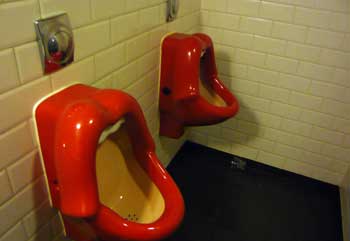
There’s a sort of famous story about a hostel that offers guests a free beer upon checkout if they leave a positive review. There are also many others that incentivize staff to get positive reviews rather than having them focus on providing the best guest experience.
So if you see a hostel with a huge number of reviews and most of them are short and 5-stars, there might be more to the story. Take longer reviews more seriously and hopefully you’ll be getting the bigger picture.
6 – Don’t forget to book early for popular hostels or in high season
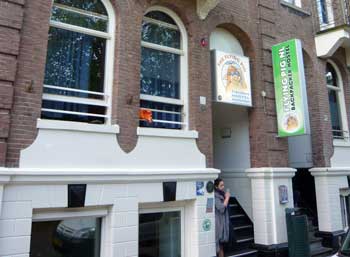
One of the great things about booking hostels is that (unlike many hotels) you only have to put down a 10% deposit to reserve a bed or room. Consider heading to Amsterdam for two nights, and seeing that your first-choice hostel is available for €18 per night. It only costs €3.60 to make the reservation and you pay the balance upon arrival. Compare that to finding out it’s full when you arrive without a booking and then having to hoof it up and down the road hoping to find a place without much to go on.
Even if you miss your train and you are a day behind schedule, you can almost always have them hold your bed for the next night, or even just shift your reservation back by one day. There’s so little to lose and so much to gain that you should really reserve as soon as you are sure of your dates, regardless of season.
7 – Don’t pay a service charge if you don’t have to
Disclaimer: Priceoftravel.com is in the partner program of hostelbookers.com, so when you book by clicking from this site, we get a small cut to help pay for the operation. The reason I am partners with hostelbookers.com is because it’s also the site I recommend and use myself, mainly because they offer the same thing at a lower price.
There are two major players in the hostel-booking scene, the larger of which is hostelworld.com, which usually shows up higher in Google searches, but they also charge a Service Fee for every reservation. So for that 2-night Amsterdam reservation mentioned above you’d pay €3.60 plus €1.50 as a Service Fee that doesn’t go toward the room cost and is non-refundable if you can’t make it.
Hostelbookers.com lists almost all the same hostels and shows all the same prices for beds and rooms, but when you reserve there is no extra fee. If the hostel you prefer is only listed on Hostelworld or other sites, then the fee might be worth it. But if it’s listed on Hostelbookers then you might as well save the money.

After using hostels for around 10 years now I have become picky when it comes to choosing the right one,for example;
– must not be a party hostel.
– I prefer dorm rooms with a maximum of 4 beds, with wooden frames I might add, I cannot deal with the cheap IKEA ones which feel and sound like they will collapse at any moment.
– Hostels who refuse long term stayers, you can often tell this by the smell of the dorm rooms, as long term stayers are extremely messy and treat new arrivals quite poorly for invading their ‘home’.
– Hostel dorms with fans or A/C which can be difficult in Europe since very few have any a/c for the hot European summers.
But at times you can find good deals on local hotels which don’t appear on major hotel booking sites…
Now I know this article was written in 2012, but since 2013 I believe? Hostelworld own hostelbookers.
Andy,
Those are some good observations. And yes, Hostelworld bought Hostelbookers and almost every other hostel-booking site in recent years, so it’s almost impossible to avoid those fees. -Roger
Nice list!
I especially like the “read before book part”. I work in a hostel myself, and, from time to time we have guests with wrong expectations leaving bad reviews and/or complaining. “you’re too far from that place” Well, my dear, if you would have done a little research you would have figured out that “that place” is in another city. No hostel deserves a 1* rating if guests don’t research in advance… The party hostel with a bar downstairs is too noisy on weekends. The family hostel has too many children around. Who would have expected this?
To reading the reviews: personally I always read the bad reviews first. So many people write “all good, good/bad breakfast, nice guys at reception, blahblah.” But those 5 gals who wrote about bed bugs in the last three months make me not going to a hostel. Again, read multiple reviews and how the hostel treated the complaining guests: didn’t care? changed the room and put others in? locked the room and professionally cleaned it?
i really admire the way u organize all your points and i am really fond with how easy you get your point across. one of the best traveling sites I’ve seen, keep it up
Number 5…
Just returned from Fes where a very popular hostel offers a free meal if you leave a review before check out……now of course no one will leave a negative review then go and collect their meal…..
Moral dilema for a backpacker on a budget who did not really enjoy the place?
Great tips! You can also sometimes avoid paying a deposit all together by booking directly through the hostel if they have a website/e-mail. That way if you get there and it doesn’t turn out to be quite what you were expecting you haven’t lost any money, no matter how small the amount.